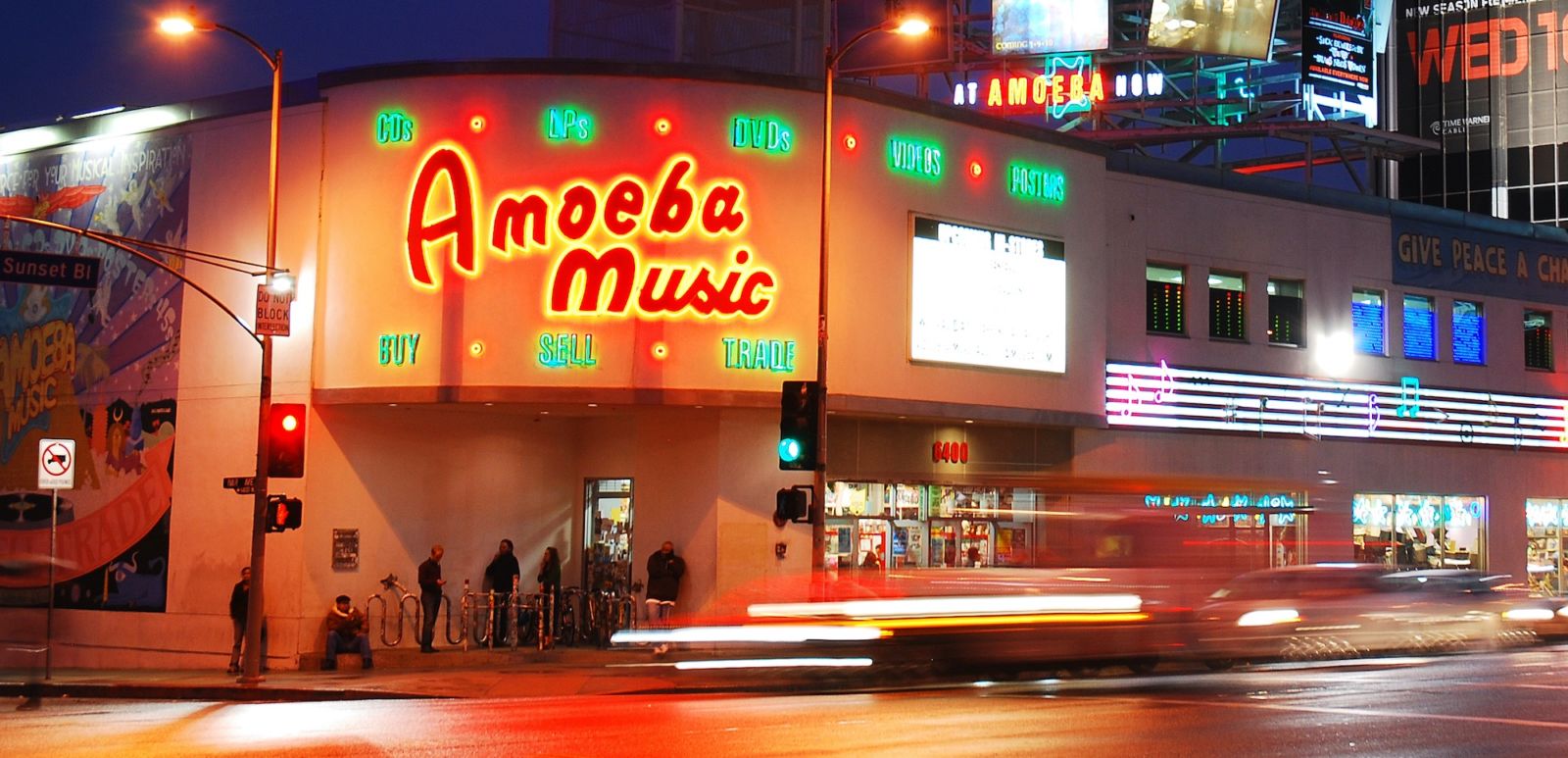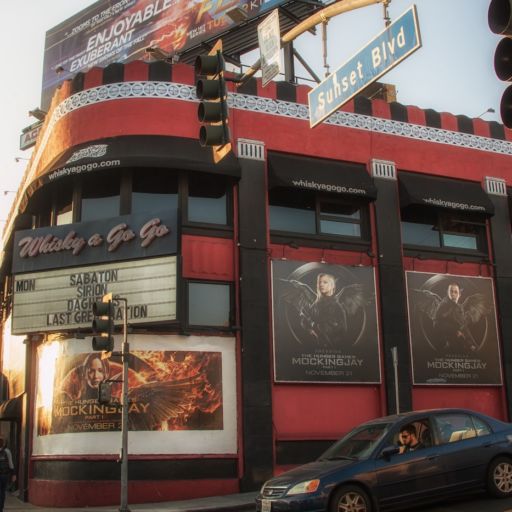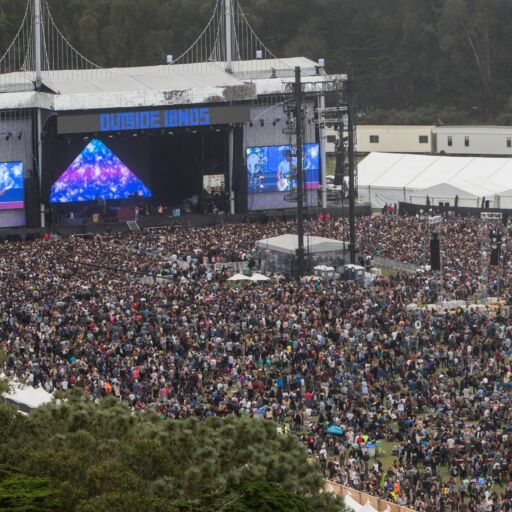A California institution for 30 years, there’s a wow moment that’s unavoidable when one walks into Amoeba Music. Its three iconic locations, in Berkeley, San Francisco and Los Angeles, have captivated the hearts, minds and ears of the masses, and have earned the company a reputation as much more than a typical chain of record stores.
Enabling an aura of discovery, congregation, and live performances, fans both regional and the world over have flocked to their stacked outposts, famously filled to the brim with its massive selections of records, CDs, posters and tapes, whether one is hunting for an obscure avant-garde out-of-print European electronic drum funk release from the 80s, or the latest from Kacey Musgraves. But to call Amoeba simply a record store would sell it short, as its status as a community hub and refuge have turned it into local, and global, cultural legends.
It’s why the company is supported by a rabid fanbase of passionate tastemakers, creatives and entertainment connoisseurs of all ages, many of whom rallied to their side to help navigate through pandemic-related closures, and all of whom have a story about a favorite score or musical revelation that only a place like Amoeba could make possible.
In celebration of the impending opening of their newest outpost in Los Angeles and in honor of the fiercely independent chain’s three decades of vibrant business, Fifty Grande set about to explore the lore and history of Amoeba Music. We spoke to company co-founders, cultural observers and Amoeba superfans about its charmed history, major discoveries, and what sets Amoeba apart from the rest.
Rick Gershon (VP, Media & Strategic Development, Warner Records): A record store you ask? Amoeba is so much more than that.
David Wild (Music writer, critic): I was raised in record stores, educated in record stores, and found safety from my parent’s divorce in record stores. To me, Amoeba is the ultimate sense of belonging.
Rachael Ray (Television show host, chef, Amoeba donor): You can get lost in there, in a good way.
Anthony Fantano (Critic, writer, The Needle Drop host): It’s kinda like the music nerd’s equivalent of being let into the everything-is-edible room over at Willy Wonka’s chocolate factory.
Mary Ramos (Veteran music supervisor for the films of Quentin Tarantino, Little Fires Everywhere, Mrs. America): I always stumble across some incredible gems that I wouldn’t have found anywhere else.
Jorma Taccone (Writer/director, The Lonely Island host): Amoeba is like walking into a pirate’s treasure trove. You are always going to find gold there.
Rick Gershon: Depending on the level of your own personal lust to gather in the dust of vinyl, collectable paraphernalia and physical music consuming, this is holy mecca.
Marc Weinstein (Co-founder, co-owner): It’s a deep love and passion people feel on each side of the counter when they walk in that’s infectious.
Joel Selvin (San Francisco Chronicle music columnist from 1972-2009): It’s a community center and that’s what Amoeba understands about the nature of record retailing.
An Oral History of Amoeba Music — Humble Beginnings
Joel Selvin: There was a Berkeley record scene that developed on Telegraph Avenue in the 60s. Folk music sent listeners into small record stores to buy albums in enough numbers to create a retail scene. I remember shopping records there where they had listening booths where you could sample everything. In the mid-60s, rock became important and college students were the main customer base. There was Record City, a tiny little hole in the wall and Discount Records where you could buy 3 records for 10 bucks.
Dave Prinz (Co-founder, co-owner): My favorite store was in Berkeley which had all these cool bootlegs and imports, and it was called Rather Ripped Records.
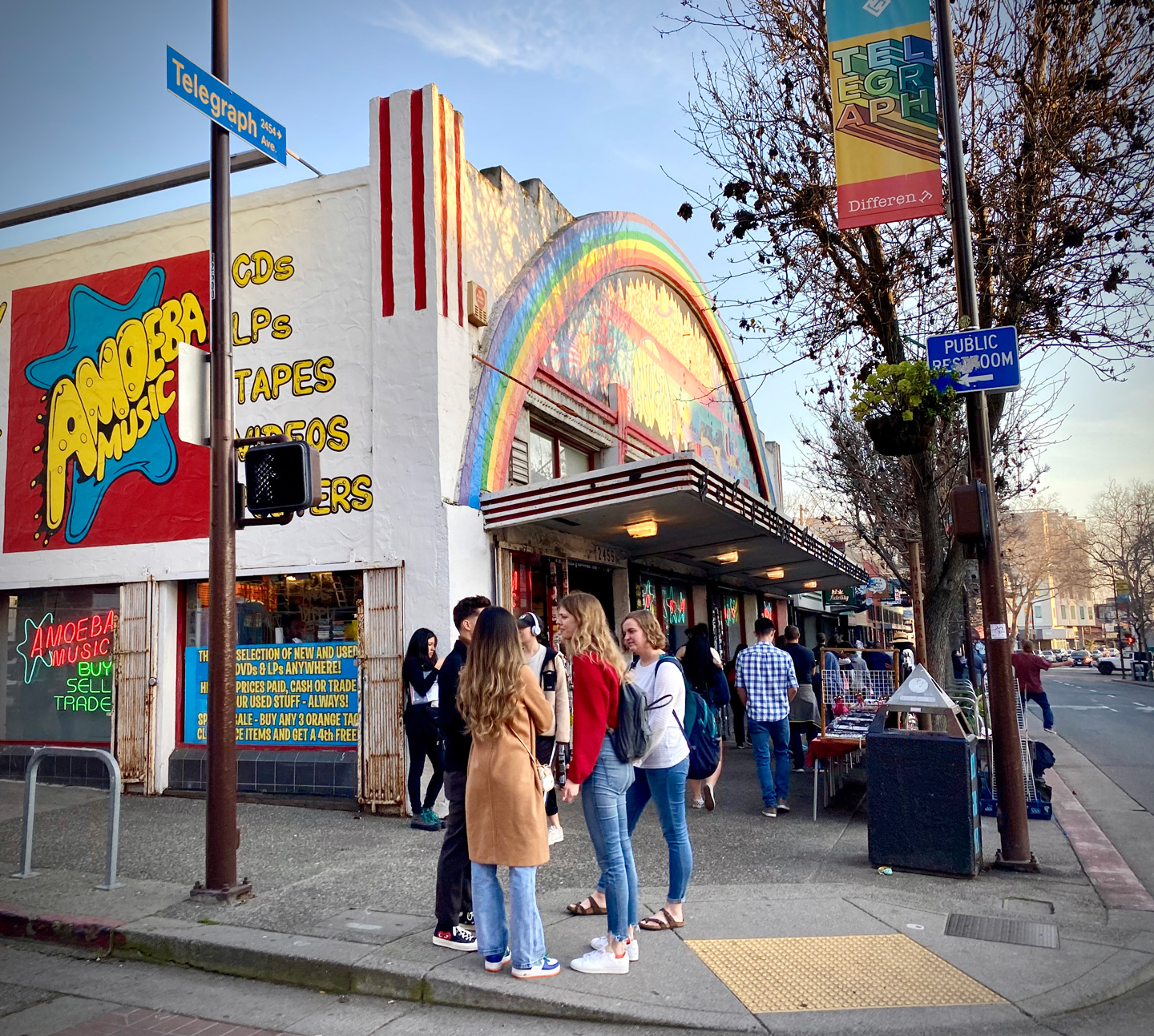
Marc Weinstein: I had a dream of opening a store someday, my picture of it was more of a neighborhood spot. The last store I worked at was Stretlight Records in San Francisco, they had a nice little 2,000 square foot spot in the 80s. In my mind, the dream was making it that scale. I met my future partner Dave when I was managing Streetlight Records. He happened to live in the neighborhood. When he’d come in to shop, we’d gab about various things, one of which was that I’m from Buffalo, New York and he went to college there. So we shopped at all the same record stores and had that in common. Aside from a love of records, we also shared a love of cannabis. Dave had a way to get cannabis from Hawaii, which was beyond legendary. One day he asked if I wanted to try some and we literally sat in his car outside of the store after closing one night and had a joint together. In the times before Blockbuster became popular, he had just sold a 17 video store chain called Captain Video he owned in the Bay Area and said, “I have some time off but I really need to come up with another business. I was wondering about the record business,” and started peppering me with questions. I think it became pretty obvious right off the bat that it’d be a great partnership; he has so many skill sets I don’t have, and I have so many skill sets Dave does not have.
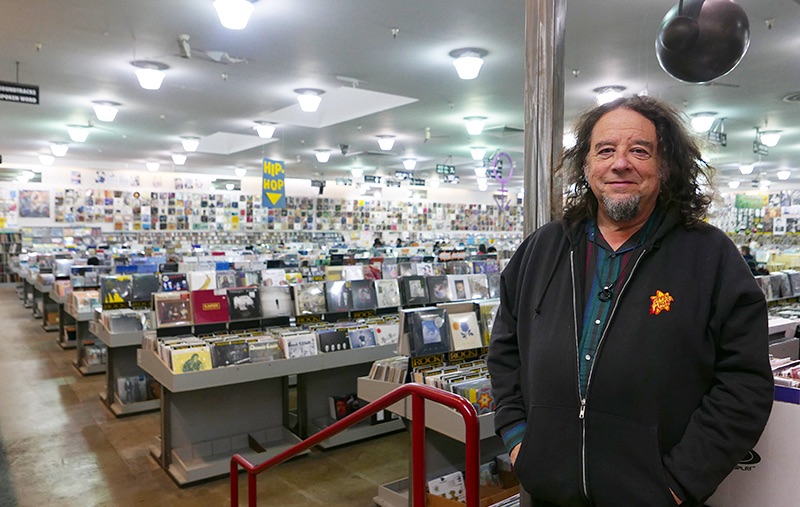
Dave Prinz: Record stores used to have the word Records in the name, so there were a lot of alliterative names. But we didn’t want to put ‘records’ in the name because this was the 90s so we decided the store should be called something “music,” and alliterative with “music.” Moose Music? McGillicutty Music? Mom’s Music? Then it just popped into my head, it doesn’t have to start with an M. What about Amoeba Music? Marc looked at me: “You know, that’s not bad.” Also, no big chain would ever call themselves something that stupid. It’s an out-there name people could gravitate to if they felt the same way.
Joel Selvin: I don’t know how to explain that first building. It had been The Forum, a coffee shop that’d open onto the Telegraph Ave sidewalk which was the hippest place in the world. I remember seeing Bob Dylan sitting there with his boots up one day. Amoeba took over this hallowed spot, right near Moe’s Books, another huge institution. These stores were not in the business of selling retail products. They were involved in cultural advancement, and that was the understanding that Amoeba brought as well.
“The minute they opened their doors, they were a full service cultural service.”
—Joel Selvin on Amoeba’s first location.
David Prinz: A night or two before we were supposed to open, a building that was the Berkeley Inn which was across the street from us, burned down. It was scary because we didn’t have any insurance on used products, and the embers were flying across the street and landing on our roof. We were up there all night with hoses and pails of water putting out embers on our building. We came back the next morning and there was a big line around the block, all of these people who were waiting or for us. There were so many people there that first day that it was way beyond our expectations. To this day, I’ll never forget that.
Joel Selvin: The minute they opened their doors, they were a full service cultural service. And everything worked from day one.
Dave Prinz: That first day, the click of everyone going through CDs was almost deafening. It was a beautiful sound. Hundreds of rows were clicking at once.
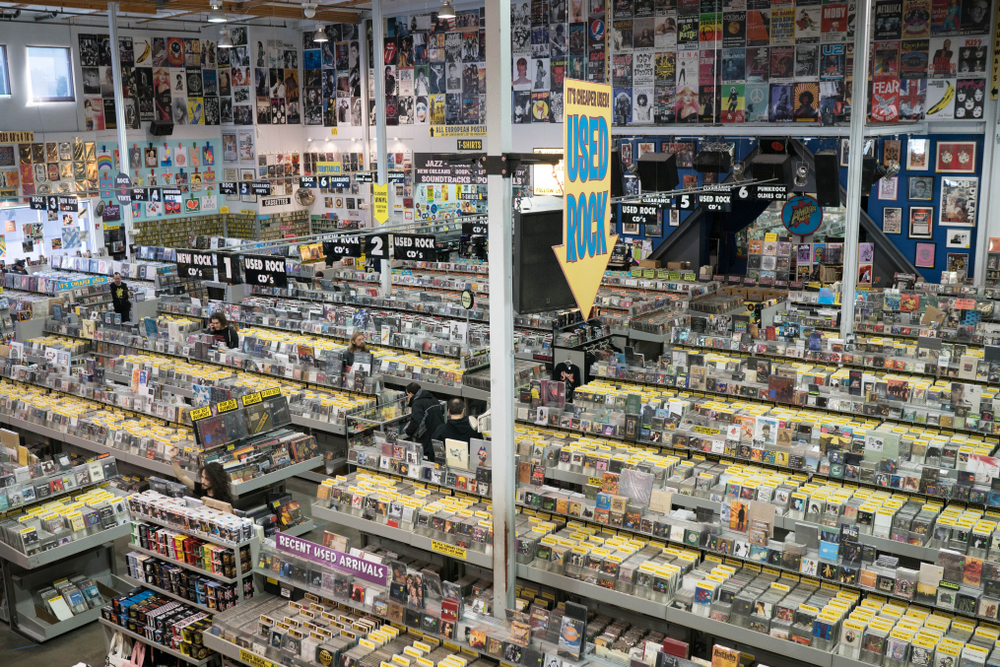
Mike Spitz (Author, The Record Store Book): What makes Amoeba unique is mainly the size of the store; it has everything. Tower was like that too. But Amoeba had the atmosphere of a small record store atmosphere and decor.
Marc Weinstein: One of the things people loved about us in the early days is that we tried to create a bin card for every single artist who had at least two titles. That in itself was kind of a mind-boggling thing for people; they couldn’t believe that some small band had their own bin card. Long before the internet, that was a big deal and it lent to an air of legitimacy for the smaller artists who never got treated with that kind of respect. We wanted to make sure the musicians felt respected and supported in a way they would promote and wish.
Dave Prinz: Out of nowhere, this kid comes into the store asking if we needed any artwork done. We actually did, and it happened to be Shepherd Hendrix, a comic book artist who was second cousins with Jimi Hendrix. That’s who did our logo, and then we never saw him again.
David Wild: My first Amoeba experience was at the Berkeley one and I spent a lot of time there. It was a field of dreams. As a movie buff as well, there was no happier place for me and my wife. Well, being there when my kids were born, that was very nice. But the hospital didn’t have a really good section of oldies.
Marc Weinstein: In the earliest days we never imagined how big we’d get.
An Oral History of Amoeba Music — San Francisco Expansion
Marc Weinstein: For seven years (from 1990 to 1997), the Berkeley store was the only store. It kept growing and getting busier all the time. It grew twice to become over 12,000 square feet and everybody from the whole Bay Area of six million people were coming to our store.
Joe Goldmark (Partner, Amoeba Music): I’m a record collector and a musician. I play pedal steel guitar. I worked for a while on the business with Dave Prinz, Captain Video. I got to know him pretty well, so I went with one of his partners and we started Escape from New York Pizza, a local pizza chain and that’s a block away from where Amoeba is now. When the boys, Dave and Marc, decided to expand and open a store in San Francisco, they found the Park Bowl, which was a bowling alley. They asked me if I was interested in coming aboard to manage and be a minor partner. I jumped on it.
Joel Selvin: It was an old fashioned bowling alley and it had been renovated by KFAT-FM Radio’s Gilbert Klein, a DJ who started putting music videos at the end of lanes and cutting the lights; he introduced a concept called Rock & Bowl. It took off like a team of horses and became the last bit of life in this bowling alley. But that went belly up in 1996 and the real estate became valuable.
“It just got so much momentum. There were record stores, clerks and collectors who saw us as this kind of mecca.”
—Marc Weinstein, Amoeba Music co-founder
Marc Weinstein: The condition of it was really bad, but he was abandoning his lease and we got in there early to look at it and ended up getting it very magically as it came our way without ever going on the market. We built that store out for the better part of a year and when it opened it was 25,000 square foot and kicked things into high gear in a way we never imagined.
Joel Selvin: I remember they wanted me to speak at the permit board and there was a huge crowd of supporters who wanted to see it open. The only people who didn’t were the other record stores. From day one it was a culture center, and much more.
Marc Weinstein: It just got so much momentum. There were record stores, clerks and collectors who saw us as this kind of mecca. If they wanted to make their career working in a record store, there was no better place to come.
Joel Selvin: I remember seeing Gary Floyd there at the front door. He was a singer in a San Francisco rock band called Sister Double Happiness. Those of us who knew them admired them greatly. Out of the store comes the Sheriff of San Francisco, Mike Hennessey. I said, ‘Mike, how are you doing? Meet Gary Floyd!” And the Sheriff said, “I’m such a fan! Sister Double Happiness is my favorite band!” I said, “Hey Mike, what are you buying today?” And it was a Sex Pistols album. Gary’s sitting there going, “This guy’s the Sheriff?”
An Oral History of Amoeba Music — Amoeba Goes Hollywood
Marc Weinstein: We had so many customers say, “There’s nothing equivalent of a store like this in LA, you really should be in LA.” Dave and I were like, “Well, thanks, but we’re not looking to expand to another city.” But it was nonstop, people were saying, “LA needs this store.” But there were people from LA who made the trip to San Francisco, regularly, to buy records. So it just sort of dawned on us.
Marc Weinstein: The story of how we got our building on Sunset Boulevard in LA is also pretty magical. It was originally being built for a camera company. Dave wanted it but I said, “Dave, we’re not going to get it. It’s being built for someone else.”
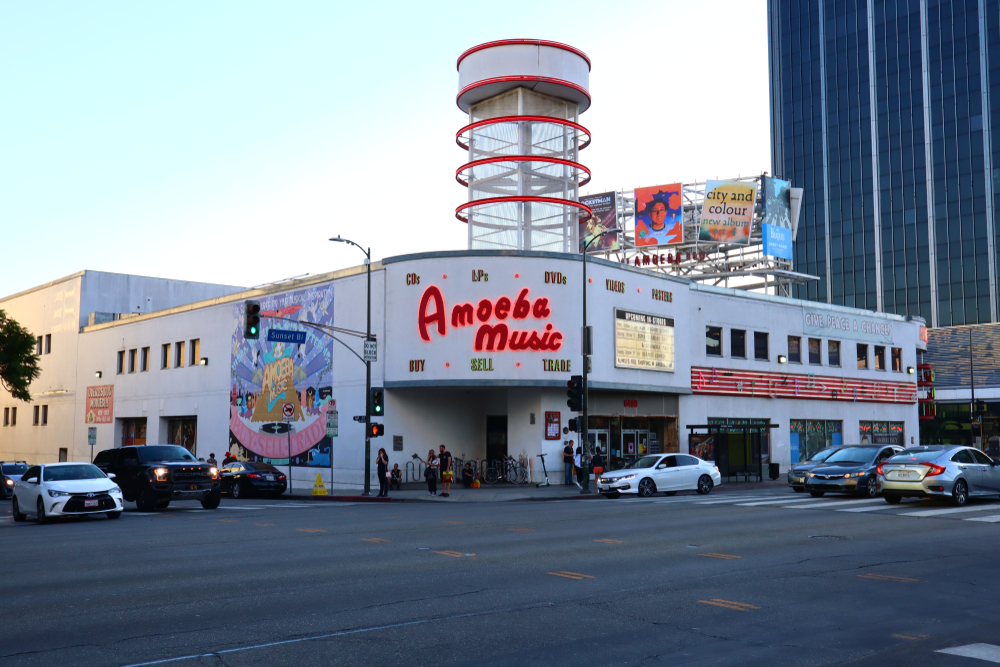
Dave Prinz: As we were crossing the street to just look at it, a kid walked in front of us wearing an Amoeba shirt. It was a sign.
Marc Weinstein: Sure enough, after we were ready to sign a lease on another space, at the last minute, we got a call. The company realized that it was more space than they could handle.
Mary Ramos: I’d been working with Quentin (Tarantino) since the early 90’s, so when Amoeba opened in LA, it became the place to begin looking for the rare CDs and vinyl he wants. I’d be heading over there several times a day sometimes.
Marc Weinstein: When we moved out to LA (and opened November 2001), we had all of these interesting label people come in and say, “Hey, we’re going to own your windows and pay for these waterfall displays and videos.” We were like, ‘We’re honestly not going to do that. We’re not like all the other stores in LA, we’re coming down from the Bay Area. We have a whole different style and don’t really do that pay-to-play stuff at all.’ We like to put all the independent artists right next to the major label artists being promoted with big money and give them all the same fair chance to find their people.
Rick Gershon: You can walk through the odorous stretch of Hollywood sidewalks, but once you arrive at Amoeba you can walk into a welcoming world where everyone is equally blissed out.
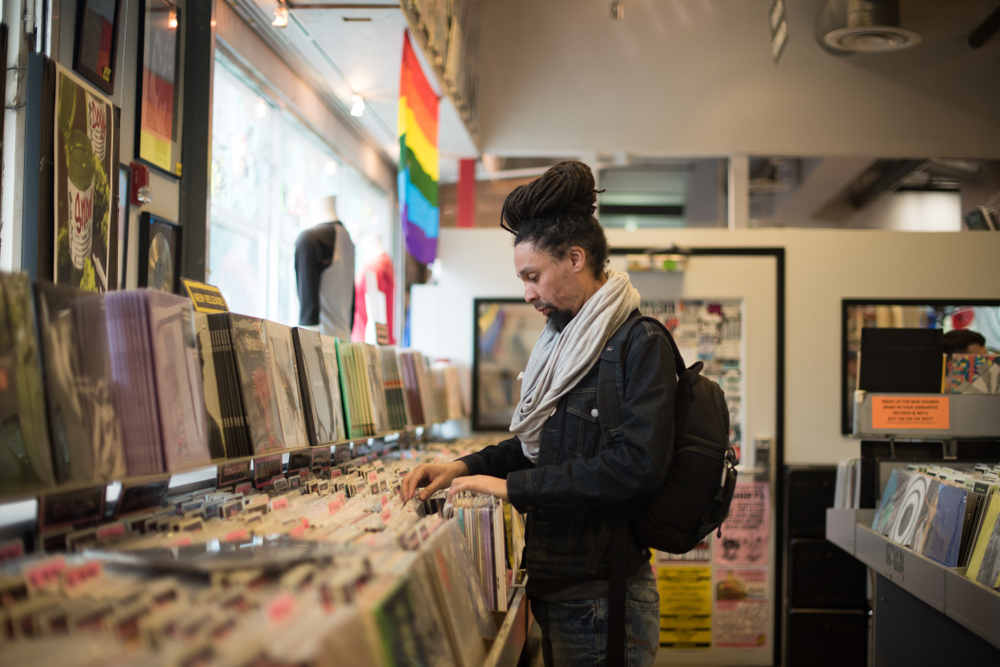
Alison Martino (Writer, historian): Every time I drive by the location in Hollywood, it instantly reminds me of why I’m a fan in the first place.
Mike Spitz: Of the three Amoeba stores, I really liked the LA store the most with its interior design and colorful walls. I have good memories of just being there for hours, listening to music that I want to buy, and then making my choices.
Rick Gershon: On scuzzy Sunset Boulevard, what other reason would any sane middle-aged man want to go there? Hollywood’s best days left for San Francisco long ago but ah, Amoeba. A bright shining jewel against the faded once-great myth of Southern California.
An Oral History of Amoeba Music — Major Scores
Mary Ramos: Way before researching and ordering music online was even a thing you could do, Amoeba was always my favorite place to discover new music. And I have to say, researching online is still nowhere nearly as satisfying or as excellent an experience as getting lost in the bins of Amoeba.
Marc Weinstein: The depth of our catalogue is what we were all about. The reason why we’re so large in scale has everything to do with the size of the subject. You can’t begin to put all the titles out into a store even twice as big as our store on Sunset. But we always tried to be as deep as we possibly could. And 50 percent of our business is used records.
Rachael Ray: It’s one of those places you could just go and kind of geek out.
Lily E. Hirsch (Author, musicologist): When you actually browse hardcopies and explore a forgotten world of album art, you can really push yourself out of your comfort zone, help keep certain music alive, and you get to experience those moments when music that means something to you once, in terms of touch and sound.
Jorma Taccone: My happiest finds at Amoeba were when I started sampling music to make my own beats for our earlier Lonely Island songs. I remember finding a Venitian harp record in the dollar bin which I sampled for one of the first (Lonely Island) songs called “Stork Patrol” and losing my mind with how much I loved it.
Lily E. Hirsch: Growing up, Amoeba Records was iconic to me with its mysterious name (“Amoeba,” why?) and its cool status. Along with a young person’s identity exploration, I’d also have this kind of anticipatory feeling of discovery; the excitement of the unknown. What will I find? It’s the same feeling I would get later when I was researching as a musicologist in an especially impressive library or archive in some far-off place.
Joel Selvin: I’m not your normal record buyer. I’m looking for that European import that has a track never released. And before the internet, you could never find stuff like that other than at Amoeba.
“I found a John Coltrane’s A Love Supreme original mono pressing.”
—John Cusimano
Jorma Taccone: I remember hearing Tom Waits’ “Rain Dogs” blaring from the in-store speakers when I was 14 and lost my mind, thinking I alone had discovered a genius.
Rachael Ray: I discovered Amoeba because of my work with Food Network. I was just researching what I would want to do in LA; I was looking for stuff that I would be really excited about sharing with folks. I think the best find I ever had at Amoeba occured years later when I took my husband, John, there.
John Cusimano: I found a John Coltrane’s A Love Supreme original mono pressing.
Rachael Ray: In beautiful condition. It was a find for us.
Joe Goldmark: We’ll lead you to where a record is, if we have it, and we often do. You also don’t need any money to shop at Amoeba, as we’re also this trading post. You can then go shopping with your store credit without having spent any money.
Alison Martino: I’ve been buying and selling there forever. It’s my go-to record store, but they sell so much more than records. I have purchased some very rare posters over the years that have become my most prized possessions.
Jorma Taccone: I bought Michael Jackson’s Thriller at Amoeba when I was just six years old. My dad didn’t want to park on Telegraph Avenue, so he made me go in and buy the record alone. I still remember the slightly disappointed look on the ultra cool, punk rock clerks face when I put Thriller on the counter. I could tell that he didn’t approve of my very mainstream taste, which, even at six, I respected. And in high school I spent basically every dollar of my allowance on vinyl hip hop records after Akiva (Schaffer) and I both bought Technic 1200 turntables and decided to DJ battle each other every week.
Mike Spitz: I bought mostly used records and CD’s there, but mainly jazz CD’s. Most of my Miles Davis, Bill Evans, Sonny Rollins, John Coltrane and Keith Jarrett CD’s, among many others, are from the LA Amoeba store.
An Oral History of Amoeba Music — Performances and Run-ins
Marc Weinstein: We have a credo to leave the stars who come in the store alone: Do not fucking bother them. Let them have a good time. But when Joni Mitchell came in, in this case, here’s a rare musical God that I just couldn’t help but introduce myself. I said, “Hi Joni, I’m one of the owners of the store. I wanted to welcome you and I’m such a huge fan.” My voice was probably quivering. She put her arms out and gave me this big hug and I remember floating down the aisle. Interestingly, my wife called. She was back in the Bay Area driving our daughter to a blood test. I said, “You won’t believe it, I just met Joni Mitchell!” And my wife’s like, “Really? Damn you.” She was kind of mad at me; I’m having a good time and she’s going to the hospital. So when Joni came to check out, I told her the story and how bummed my wife was and asked if she could speak to her, which is ridiculous. But she said, “Sure! What’s her name?”
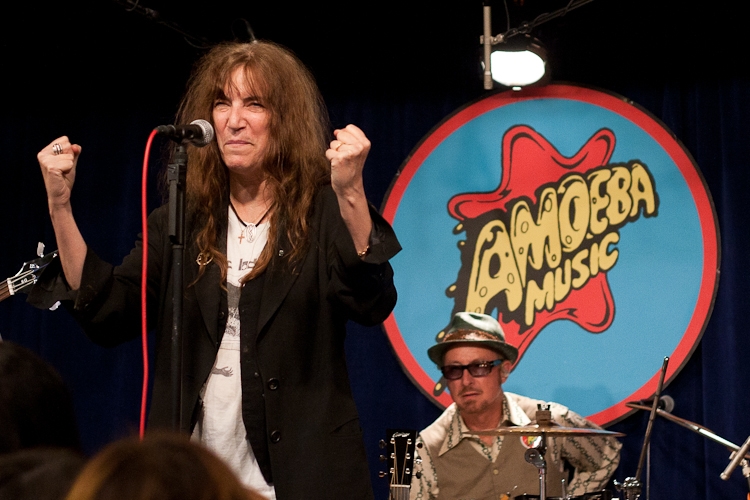
Joe Goldmark: When Jimmy Page was in the store shopping, I got to talking to him when I was checking him out. He was buying some vinyl, but somehow the conversation went to Bigsby Guitars, which was an early guitar that predated the Fender and was the Cadillac of guitars in 1950 for instance. I happened to have a Bigsby steel guitar and we bonded over that. It was kind of impressive for the staff; here’s their old boss who’s getting on with Jimmy Page.
Marc Weinstein: I also remember getting to stand there and talk to Robert Plant in the store.
“One of the greatest days of my life was seeing Paul McCartney at Amoeba.”
—David Wild
Joe Goldmark: A stand-out performance would have to be Elvis Costello. Jack Black’s band Tenacious D packed the place. We had to turn people away, that’s 500 or 600 people, at least. We had Jack White with one of his offshoot bands also pack the place.
Joel Selvin: I remember people like Chris Isaak introducing a new album there. I went to the Brian Wilson signing a few years ago.
Marc Weinstein: But the McCartney in-store was probably the greatest day of my life outside the day my daughter was born.
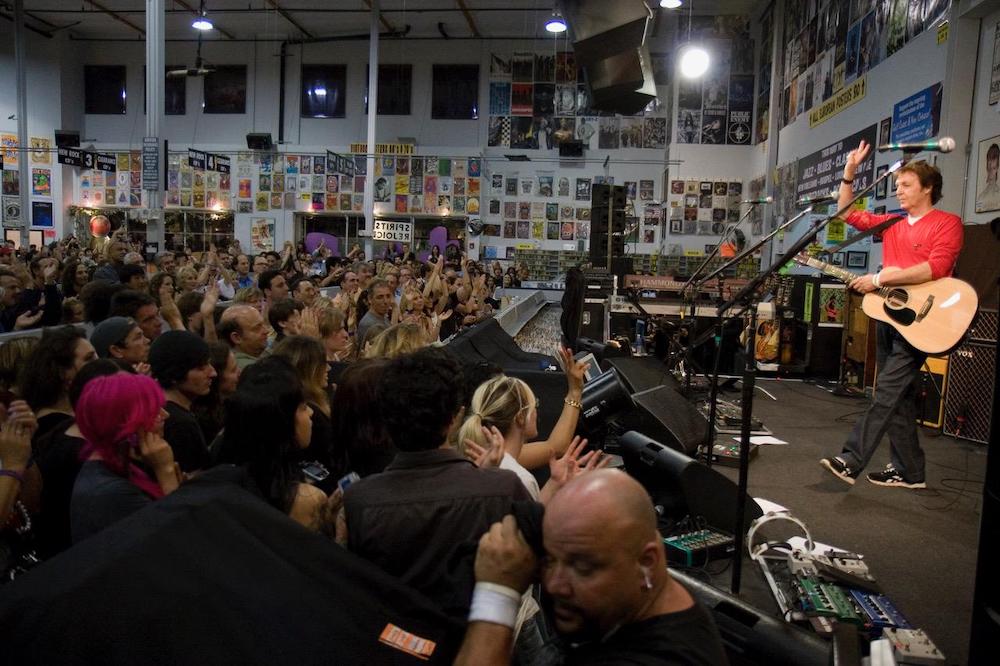
David Wild: One of the greatest days of my life was seeing Paul McCartney at Amoeba.
Dave Prinz: Of course the highlight for me was meeting Paul McCartney there.
David Wild: My brother-in-law said taking him to that show was the greatest thing I ever did for him.
Dave Prinz: His people called us and said, “Paul’s looking to do an in-store performance. He’s never done one and The Beatles had never done any. This would be the first in his career and he’s picked your store. Would you guys be interested?” It’s the biggest honor Amoeba could ever get.
Marc Weinstein: We were charged with getting it set up and keeping it quiet for a couple weeks. They had almost Secret Service-level security.
Dave Prinz: He did a whole soundcheck and played for almost an hour. When I met him he said, “You’re the owner? I noticed you out there.” You think about a guy like that who’s so revered and for him to say something like that, could you be any kinder? He said, “This is the greatest store in the world. I’ve never seen anything like it.”
Marc Weinstein: Tears were falling down my face the whole time. It meant so much for so many people for that to happen.
David Wild: We were [seated] in the “C” row of releases. Alanis Morissette was in front of us and Ringo Starr was behind us. I remember thinking, “Okay, I don’t think Alanis should be in front of Ringo. And they should both be in front of me.”
Dave Prinz: Oh my God, it was the greatest day ever. I’ll never forget it.
An Oral History of Amoeba Music — An Online Footprint
Joe Goldmark: The [Amoeba] website is [based in] Los Angeles. Though we film some of the YouTube shows that end up on the site in San Francisco. The whole purpose of the site, which launched around 2006, was to expand our footprint and get the word out there. Keep us vibrant and relevant.
“When you go to somebody’s house and see their record collection, you find out a lot about them.”
—Dave Prinz
Dave Prinz: I don’t know exactly who came up with (webseries) What’s in My Bag?, but I really love them and like to watch them myself. When you go to somebody’s house and see their record collection, you find out a lot about them. For somebody to talk about what they like musically, it just gives you an insight into who they are that you could never get on a talk show or a magazine interview. It’s this bridge to the soul you don’t get to see otherwise.
Lily E. Hirsch: I just watched the Jason Mantzoukas episode of What’s in My Bag? and seeing his finds, from all over the world, was such a nice reminder of what’s possible at Amoeba.
Anthony Fantano: My What’s In My Bag? experience was so wonderful. I mean, I knew Amoeba was always hype, but it was amazing to see it lived up to the hype. The selection was amazing, the store was well-taken care of, the staff was knowledgeable, and there was coolness oozing out of every corner of the building.
An Oral History of Amoeba Music — A Personal Touchstone
Marc Weinstein: The passion and love for the music is first and foremost. If you remember places like the vibe of Virgin Records, they were more like a bank. There was no warmth or feeling. It was just product. We always went way out of the way to remove all of those trappings.
David Wild: My kids remember my wife saying to them, “Yeah, go be with your father and all the other freaks at Amoeba on Christmas.”
Joe Goldmark: We give people a fun place to go and hang out, from kids to older folks. In reality, there’s not a lot of great places to go and hang out. Especially if you love music, you can easily spend two or three hours perusing and crate digging and having a satisfying time like no other. When I go to another city I’ll try to go to the local used record store and hope that it’s nearly as good as Amoeba. But none of them are ever as good , if I may say so myself.

Mike Spitz: When I was working on The Record Store Book, I have fond memories of taking photographs of Marc Weinstein and we had a good time together. I remember him taking me into the back offices where only the staff go. There were so many cool records all over the place that they did not or had not placed out on the sales floor. I remember saying to Marc something like, “So, this is where you keep the good stuff, the not-for-sale stuff.”
David Wild: Amoeba has probably saved me millions in therapy. I don’t go to bars, I don’t do drugs. I’ve always spent all my excess money on albums, CDs, Vinyl, and 8-tracks.
Rachael Ray: It’s a place that I went to because I thought it would connect my worlds: It would make me more excited about visiting LA and it would make me feel like a New Yorker because we had so many great record shops back in the day.
Dave Prinz: Even during the pandemic, there’s not a whole lot of things you can do. So it’s actually a little busier than it used to be before the pandemic.
Rick Gershon: Whether you’re a casual Top 40 dabbler or perhaps a voracious, hoarding, vinyl-sniffing repeat offender like me, it’s going to be alright; you’re among friends.
Mike Spitz: It’s good to have everything under one roof and get lost in a big record store. There is nothing better.
An Oral History of Amoeba Music — The Future
Joel Selvin: The store sells books, stereo equipment, they’ve made their way through this extraordinary difficult landscape of record retail. Amoeba Music was already a survivor when the pandemic hit, if you didn’t already notice.
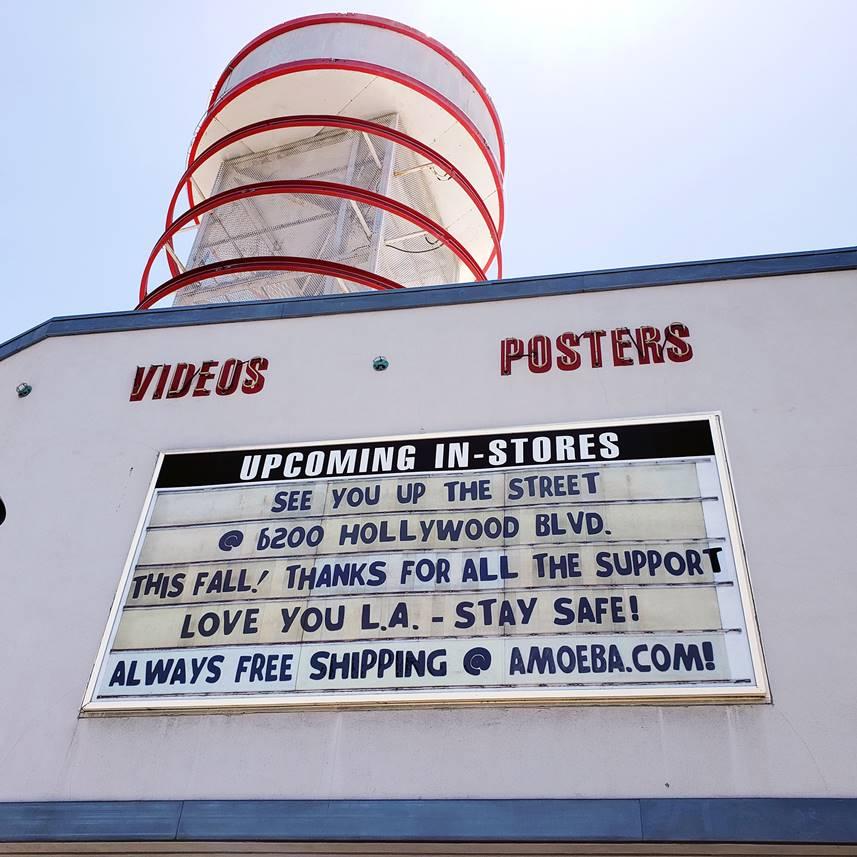
Dave Prinz: A lot of people were really upset when we sold the original LA building, like we were cashing in and ending Amoeba. But it wasn’t that. We had to sell that building to pay off a lot of debt. In the end, Amoeba survives and will have a beautiful new store in LA.
“We’ll be fine and the new building is beautiful. We’ve been setting it up during the pandemic.”
—Dave Prinz
David Wild: I had a pang of heartbreak seeing Amoeba in LA being stripped away. I haven’t emotionally prepared myself for the new location. I’m sure I will. It’s like any other relationship. I need to take a little time for myself and then reinvest in my new relationship.
Dave Prinz: Selling that building enabled Amoeba to bridge a very difficult gap in the record business, a lot of stores didn’t survive. We needed that money to keep the stores alive. But we’ll be fine and the new building is beautiful. We’ve been setting it up during the pandemic.
Marc Weinstein: After 30 years, me and Dave are still a partnership that works pretty well. Dave is a money guy, contract guy; he deals with the attorneys and real estate people, and I hate all that stuff. The vast majority of the time we’ve been together, we’ve worked very well together.
Jorma Taccone: A couple of years ago I shot a music video for my brother Asa’s band Electric Guest for a song called “Dollar” which was all about Asa coming home to the Bay Area. Of course we contacted Amoeba and they immediately told us to swing by. We shot there for an hour, in and around the stacks, just me and my brother with a video camera in the best fucking record store in the world.
Marc Weinstein: LA Magazine did a thing about 10 years ago: a bracket about the 100 greatest things about LA and had people voted. We made it to the final three and were up against Disneyland and the weather. And we won.
Also see:


